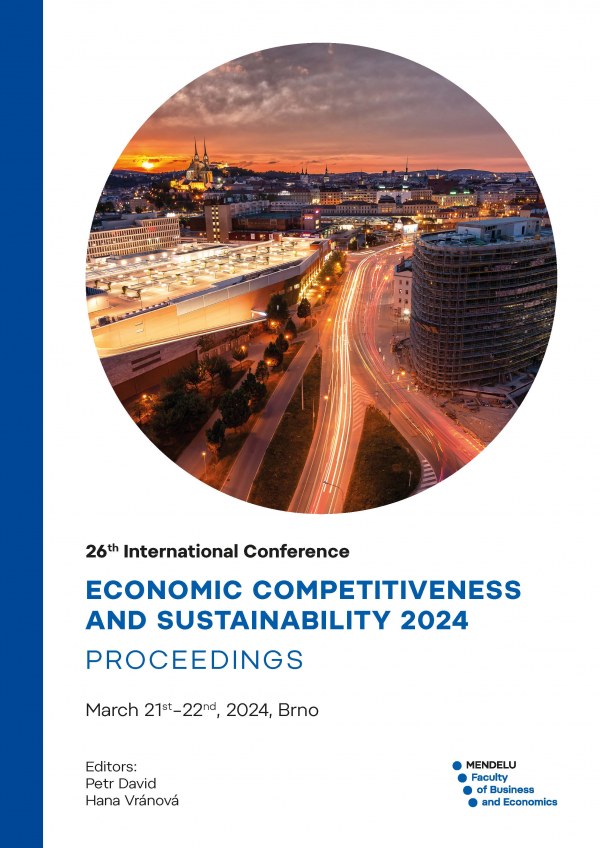
DOI: 10.11118/978-80-7509-990-7-0065
DIFFERENT INSIGHT INTO THE VAT GAP USING MIMIC MODEL
- Iva Hasíková1
- 1 Department of Finance and Accounting, Faculty of Business and Economics, Mendel University in Brno, Zemědělská 1, 613 00 Brno, Czech Republic
The paper focuses on the estimation of the MIMIC model for quantification of VAT gap. MIMIC model is a specific type of structural equation models, which treats the VAT gap as a latent unmeasurable variable whose emergence and size are influenced by causes and whose presence is reflected in indicators; causes and indicators must be measurable. The contribution of this model is identification of causes of VAT gap, that are potential sources of VAT collection inefficiencies. The MIMIC model was built on data from selected European countries and according to the model VAT gap has these significant causes: openness of economy, corruption perception index, general government expenditure, final consumption and e-government development index. Developed using data from European countries, the model can be applied on each of these countries for quantification of VAT gap. These outputs can support the recommendations leading to improved efficiency of VAT collection.
Keywords: VAT gap, determinants of VAT gap, efficiency of VAT collection, MIMIC model, structural equation model
pages: 65-74, online: 2024
References
- ACOCK, A. C. 2013. Discovering Sturctural Equation Modeling Using Stata. Vol. 1. Stata Press. ISBN: 9781597181396.
- AIZENMAN, J. and JINJARAK, Y. 2008. The collection efficiency of the Value Added Tax: Theory and international evidence. Journal of International Trade and Economic Development, 17(3), 391-410.
 Go to original source...
Go to original source... - ALM, J. 2012. Measuring, explaining, and controlling tax evasion: lessons from theory, experiments, and field studies. International Tax and Public Finance, 19(1), 54-77.
 Go to original source...
Go to original source... - ALM, J. 2021. Tax evasion, technology, and inequality. Economics of Governance, 22(4), 321-343.
 Go to original source...
Go to original source... - ARGENTIERO, A., CASAL, S., MITTONE, L. and MORREALE, A. (2021). Tax evasion and inequality: some theoretical and empirical insights. Economics of Governance, 22(4), 309-320.
 Go to original source...
Go to original source... - BAERT, P. 2023. VAT in the digital age. European Parliamentary Research Service. https://www.europarl.europa.eu/RegData/etudes/BRIE/2023/739371/EPRS_BRI(2023)739371_EN.pdf
- BARBONE, L., BELKINDAS, M., BETTENDORF, L., BIRD, R. M., BONCH-OSMOLOVSKIY, M. and SMART, M. 2013. Study to Quantify and Analyse the VAT Gap in the EU-27 Member States. SSRN Electronic Journal. DOI:10.2139/ssrn.2365189
 Go to original source...
Go to original source... - CARFORA, A., DONGIOVANNI, S., MARABUCCI, A. and PISANI, S. 2020. The Impact of Domestic Factors and Spillover Effects on EU Countries VAT Gap. In Argomenti di Discussione.
- CHAN, S. G. and RAMLY, Z. 2018. The role of country governance on value-added tax and inequality. E & M Ekonomie a Management, 21(4), 79-93.
 Go to original source...
Go to original source... - EUROSTAT. 2016. Glossary: Final consumption expenditure. https://ec.europa.eu/eurostat/statistics-explained/index.php?title=Glossary:Final_consumption_expenditure
- FREY, B. S. and WECK-HANNEMAN, H. 1984. The hidden economy as an 'unobserved' variable. European Economic Review, 26(1), 33-53.
 Go to original source...
Go to original source... - FRUNZA, M.-C. 2019. Value added tax fraud. New York: Routledge. ISBN: 9781138298293.
 Go to original source...
Go to original source... - GODIN, M. and HINDRIKS, J. 2015. A Review of critical issues on tax design and tax administration in a global economy and developing countries. CRED-UNamur, Working Paper, 7.
- IMMORDINO, G. and RUSSO, F. F. 2018. Cashless payments and tax evasion. European Journal of Political Economy, 55, 36-43.
 Go to original source...
Go to original source... - JONSKI, K. and GAJEWSKI, D. J. 2022. 'VAT Gap'Estimation: Distinguishing Between Informality and Fraud. EC Tax Review, 31(3).
 Go to original source...
Go to original source... - KASNAUSKIENĖ, G. and KRIMISIERAITĖ, J. 2015. Using MIMIC models to examine determinants of VAT Gap in Lithuania. Organizations and markets in emerging economies, 6(1), 107-126.
 Go to original source...
Go to original source... - MORAVEC, L., HINKE, J. and BORSICZKÁ, M. 2021. VAT Gap Estimation and Influence of Selected Methods of Financial Administration on its Reduction. DANUBE, 12(1), 45-60.
 Go to original source...
Go to original source... - NOVYSEDLAK, V. and PALKOVICOVA, J. 2012. The Estimate of the Value Added Tax Revenue Loss. Bratislava: Institute for Financial Policy, The Ministry of Finance of the Slovak Republic.
- PLUSKOTA, A. 2022. VAT gap determinants in the European Union and Poland. Ekonomia I Prawo-Economics and Law, 21(3), 623-633.
 Go to original source...
Go to original source... - PONIATOWSKI, G., BONCH-OSMOLOVSKIY, M., DURAN-CABRÉ, J. M., ESTELLER-MORÉ, A. and ¦MIETANKA, A. 2018. Study and reports on the VAT Gap in the EU-28 member states: 2018 Final report. Available at SSRN 3272816.
 Go to original source...
Go to original source... - PONIATOWSKI, G., ¦MIETANKA, A. and BONCH-OSMOLOVSKIY, M. 2020. Study and reports on the VAT gap in the EU-28 member states: 2020 final report. CASE Research Paper (503).
 Go to original source...
Go to original source... - RECKON, L. 2009. Study to quantify and analyse the VAT gap in the EU-25 member states. Report for DG Taxation and Customs Union, 20, 5-109.
- SCHNEIDER, F. 2005. Shadow economies around the world: what do we really know? European Journal of Political Economy, 21(3), 598-642.
 Go to original source...
Go to original source... - SCHNEIDER, F., BUEHN, A. and MONTENEGRO, C. E. 2010. Shadow economies all over the world: New estimates for 162 countries from 1999 to 2007. World Bank policy research working paper (5356).
 Go to original source...
Go to original source... - TEDDS, L. M. 2005. Revisiting the Latent Variable/MIMIC Model Approach to Measuring the Size of the Canadian Underground Economy. In: SCHNEIDER, F. and BAJADA, C. Size, causes and consequences of the underground economy. New York: Routledge. ISBN: 9781138620575
- TRANSPARENCY INTERNATIONAL. 2023. About CPI. https://www.transparency.org/en/about
- THE HERITAGE FOUNDATION. 2023. 2023 index of economy freedom: About the index. https://www.heritage.org/index/about
- UNITED NATIONS. 2023. E-Government Development Index (EGDI). ttps://publicadministration.un.org/egovkb/en-us/About/Overview/-E-Government-Development-Index
- ZÍDKOVÁ, H. and PAVEL, J. 2016. What Causes the VAT Gap? 1. Ekonomicky casopis, 64(9), 811.


